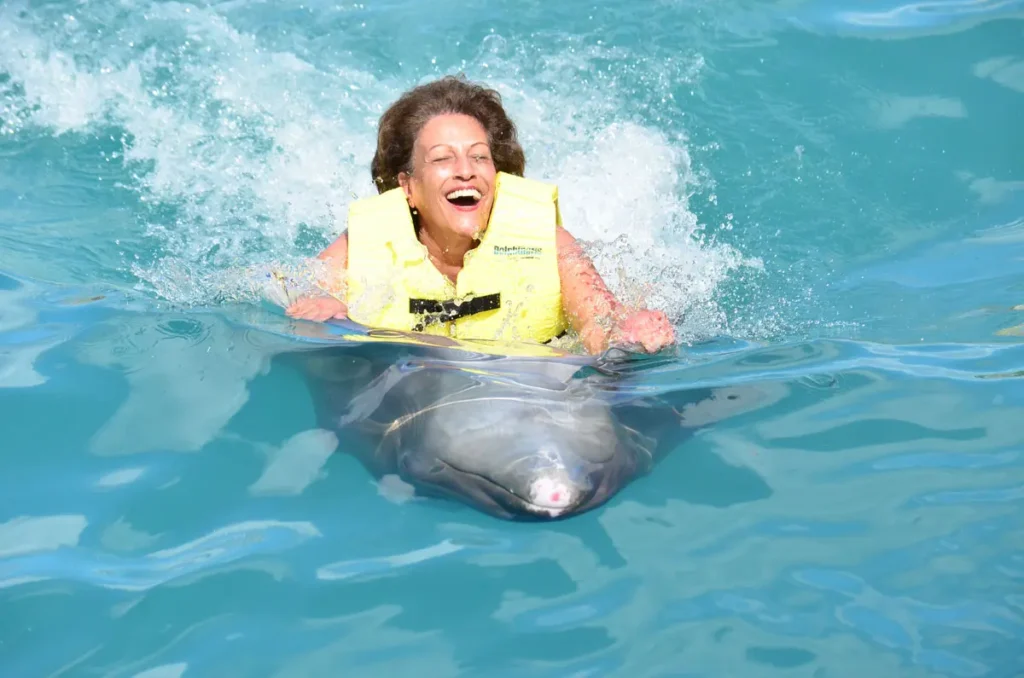
Listen to this Article
The hotel manager stood in the doorway, a brand-new shower seat in his hands. Hours earlier, Debra had shown him a photo of the model she needed: wide, stable, safe. The seat he had offered before had wobbled. For a bilateral amputee like Debra, a wobbly seat wasn’t just inconvenient, it was dangerous. By nightfall, the right seat was installed, and she could finally exhale.
It’s a moment she has lived countless times. For most travellers, a bad shower is an annoyance. For Debra, a resident of Texas, it can be the difference between an easy routine and an unsafe situation. That’s why she plans with relentless detail, confirming things others take for granted. “Don’t assume ‘accessible’ means it works for you,” she says. “Confirm it.”
Yet limits are not a factor for her. It’s about momentum, finding new ways to keep moving forward and embracing the world on her own terms. Over 50 countries, more than 150 cruises, and a simple mantra guides her: “Don’t quit. Do it differently.”
A mindset built on flexibility
That momentum begins with mindset: choosing flexibility over fear, humor over frustration, and determination over doubt. Travel, as Debra puts it, is about embracing unpredictability. “Barriers are not stop signs,” she says. “They’re just speed bumps.” That perspective has carried her through years of navigating airports, ports, city streets and running her company, Easy Access Travel.
When accessible excursions on an Alaska cruise were suddenly cancelled after the pandemic, she didn’t panic. She was transparent with her group, rebuilt the itinerary, and turned the setback into seafood tastings and waterfront strolls. “A trip can still be wonderful,” she reflects, “just different than originally imagined.” It’s an attitude she encourages every traveller, amputee or not, to adopt: expect the unexpected, laugh when things go sideways, and keep going.
The honesty factor
Debra has watched many travellers stumble into disappointment by overestimating what they can do. “People plan the trip for the person they wish they were,” she says, “not for the person they are today.” It’s an easy mistake: picturing yourself walking farther, handling more stairs, or transferring more easily than daily life really allows. But the gap between expectation and reality can quickly lead to exhaustion, frustration, or even unsafe situations once the journey begins.
That’s why Debra insists on real conversations before she plans a trip, preferably over the phone. Hearing someone’s cadence, their pauses, even the fatigue in their voice helps her understand what’s realistic. She asks about routines, mobility limits, and comfort levels, and then designs an itinerary that matches. That kind of honesty, she says, protects the three things that matter most in travel: time, money, and memories.
“Why spend thousands of dollars on a trip you can’t enjoy?” she asks. “I’d rather build something you know you can do and do with joy.”
Packing with purpose
Her own suitcase reflects that same philosophy. Instead of starting with clothes, she starts with prosthetic gear: liners, chargers, wipes, and a soft cloth all packed into a small “limb kit” she keeps within reach. The rest? Wide-leg pants for easy adjustments, and the reminder that wardrobes can bend but equipment cannot. “Think of it like a first-aid kit,” she says. “Compact, complete, and always with you.”
Flying and navigating security
Flying, she admits, can be daunting. But she’s learned that a five-minute call to the airline’s special assistance desk smooths everything: seat selection, wheelchair dimensions, even battery specifications. “Give them the details up front,” she says. “It saves hours of stress at the airport.”
At TSA checkpoints, she introduces herself before the first beep. “I’m a double amputee with prosthetics, and alarms will go off.” That clarity sets the tone. “Be polite, be clear, and be proactive,” she says. “One sentence at the start makes everything easier.” She also points travellers to the TSA Cares program, a little-known resource that can ease the screening process.
Debra always carries a wallet card with her chair’s battery and safety details. More than once, that card has turned a tense moment into a smooth one, saving her from long delays while agents tried to figure out how to handle her chair.
Why Cruising Works
After more than 150 voyages, Debra still swears by cruising as the ultimate accessible adventure. Ships offer wide corridors, elevators, roll-in showers, and consistent accessibility, all while letting you unpack just once.
And if a port isn’t accessible? For Debra, that’s not a loss. “I treat it like a spa day,” she says with a grin. While other passengers jostle for tenders or scramble onto tour buses, she slips into the ship’s quieter rhythm. The pools are calmer, the buffet less crowded, and the crew more attentive. Sometimes she books a massage or simply enjoys a near-private deck.
“Staying onboard isn’t missing out,” she insists. “It’s gaining a day of peace and luxury.”
For amputees who may tire quickly, it’s the best of both worlds: reliable accessibility and indulgence. Cruising, she says, “reduces stress, maximizes comfort, and still delivers adventure.”
Places that surprised her
Debra has learned not to underestimate destinations. London wowed her with its iconic black cabs, all wheelchair-friendly and hail-able on the street, “a confidence-builder for any first trip abroad.”
South Africa, which she expected to be difficult, turned out to be refreshingly navigable, with better infrastructure than she imagined. “Don’t write off a place because you assume it’ll be hard,” she advises. “Some spots will surprise you in the best way.”
Where the industry falls short
For all her optimism, Debra doesn’t sugarcoat the gaps. Transportation, especially buses and airport transfers, remains the Achilles’ heel of accessible travel. “Most coaches can only take two wheelchairs,” she says. “That caps group tours before they even start.” Affordable, reliable transport to and from airports is another hurdle.
Her message to the industry is clear: promises aren’t enough. Real investment and infrastructure are what’s needed.
What keeps her going
After years of carving pathways through an often-inaccessible world, what fuels her passion? The people. Debra loves the detective work of trip-planning, but what truly drives her is the moment when someone who thought life with a disability meant the end of adventure realizes the world is still within reach. Watching the return of that spark of possibility never gets old.
Her story proves it: travel doesn’t have to end when you’re a bilateral amputee. It just takes a new shape. And her mantra rings through every journey she takes and every trip she plans for others: “Don’t quit. Do it differently.”
Debra Kerper received her travel training at Coastline Community College where she was the recipient of the TATE AWARD for outstanding academic performance and goals in the travel industry. Her desire to pursue a career in Travel for the Disabled came from her personal experience as a physically challenged traveller. Debra has been living with Lupus since the age of 20, spent six years full time in a wheelchair as the result of a bone infection in her legs and became a below knee amputee at the age of 29. She has undergone over 40 surgeries and has spent much time using a wheelchair as well as enjoying long periods of good health and short distance walking. She has a very keen understanding of medical ailments and disabling conditions resulting from excessive time spent in hospitals and outpatient rehab facilities.
In February, 2016 Debra had serious vascular problems resulting in the amputation of her left leg. Adjusting to life as a bilateral amputee has not been easy but she was able to call upon her many bilateral amputee clients for support. Debra did not allow this new life-changing event to get in her way . . . she continued to work full-time and travel. Since surgery, she has escorted groups to Alaska, the Mediterranean and Hawaii. “Just Doing It Differently”
Debra travels extensively with a small power travel wheelchair and has learned how to MINIMIZE THE FRUSTRATIONS while MAXIMIZING THE ENJOYMENT of visiting new and exciting destinations. She has visited more than 50 countries and has been on over 150 cruises. She enjoys sharing her knowledge and expertise with other disabled persons as well as those who simply want to travel at a more leisurely pace. She possesses very strong interpersonal skills and a love of helping people.
